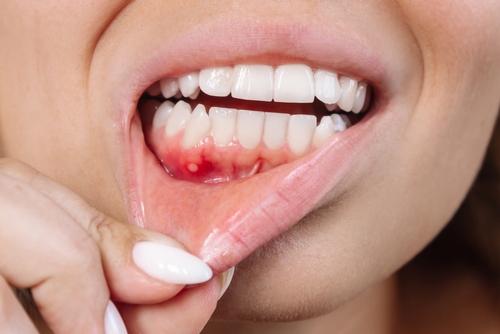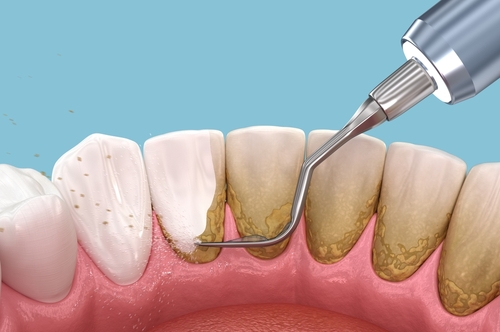Gum Disease Treatment: Protect Your Smile
 Are you worried about the health of your gums or experiencing symptoms like bleeding, swelling, or persistent bad breath? Maintaining healthy gums is crucial for overall health, as it can impact conditions like diabetes and heart disease. These could be signs of gum disease, a common yet serious condition that, if left untreated, can lead to tooth loss and other significant health issues. The good news is that with early detection by a dental hygienist and the right treatment, gum disease can be effectively managed and even reversed. At Tuckerton Dental, our skilled Tuckerton, NJ dentist, Dr. Ronald Petrosky, can help you understand the various treatment options for gum disease, ranging from non-surgical methods to more advanced procedures, helping you understand how to restore and maintain your gum health.
Are you worried about the health of your gums or experiencing symptoms like bleeding, swelling, or persistent bad breath? Maintaining healthy gums is crucial for overall health, as it can impact conditions like diabetes and heart disease. These could be signs of gum disease, a common yet serious condition that, if left untreated, can lead to tooth loss and other significant health issues. The good news is that with early detection by a dental hygienist and the right treatment, gum disease can be effectively managed and even reversed. At Tuckerton Dental, our skilled Tuckerton, NJ dentist, Dr. Ronald Petrosky, can help you understand the various treatment options for gum disease, ranging from non-surgical methods to more advanced procedures, helping you understand how to restore and maintain your gum health.
Fortunately, with proper treatment, periodontal disease can be managed, and its effects can be reversed. If you’re experiencing symptoms of gum disease, such as swollen or bleeding gums, don’t hesitate to schedule an appointment with our Tuckerton dental office by calling (609) 296-1007.
Benefits of Treating Periodontal Disease
By seeking treatment for periodontal disease, patients can experience the following benefits:
- Improved oral health
- Prevents tooth loss
- Reduces gum inflammation
- Halts disease progression
- Freshens breath
- Enhances smile appearance
- Reduces systemic health risks
- Boosts overall well-being
- Prevents bone loss
- Addresses loose teeth
Gum Disease Treatments
 There are various gum disease treatment options available. However, the treatment you receive will depend on the severity of your oral health condition. Our Tuckerton dentist will examine the extent of your gum disease and recommend the treatment best for you. One such treatment option is guided tissue regeneration, which is often performed alongside a bone graft to promote new bone growth by placing a special type of fabric between the gums and the bone graft.
There are various gum disease treatment options available. However, the treatment you receive will depend on the severity of your oral health condition. Our Tuckerton dentist will examine the extent of your gum disease and recommend the treatment best for you. One such treatment option is guided tissue regeneration, which is often performed alongside a bone graft to promote new bone growth by placing a special type of fabric between the gums and the bone graft.
Scaling and Root Planing
Scaling and root planing are nonsurgical treatments that involve removing plaque and tartar buildup from below the gum line. During the procedure, a dental professional will use specialized tools to scrape away the buildup of bacteria and debris that cause gum disease.
- Scaling: During scaling, one of our dental hygienists will use special instruments to remove plaque and tartar (calculus) from the surfaces of the teeth, both above and below the gum line. This process helps eliminate bacteria, toxins, and calculus that contribute to gum inflammation and disease.
- Root Planing: Root planing focuses on smoothing the tooth roots and removing any rough areas or harmful bacteria deposits. This step aims to remove the bacterial byproducts and promote the reattachment of the gums to the tooth roots, facilitating gum healing and reducing the depth of periodontal pockets.
Antibiotics
If scaling and root planing alone aren’t enough to treat gum disease, you may be prescribed oral antibiotics to help eliminate the bacteria causing the infection. Antibiotics can be prescribed in pill form, mouthwash, or gel that can be applied directly to the gums. Your dentist will determine the best form of antibiotics for your individual needs.
Laser Periodontal Therapy
Laser periodontal therapy is a minimally invasive treatment option that uses laser technology to remove infected gum tissue and promote the regeneration of healthy tissue. The dental laser can target and eliminate bacteria that are causing gum disease, without damaging healthy gum tissue. This treatment often requires less recovery time compared to traditional gum surgery.
Pocket Reduction (flap) Surgery
Pocket reduction surgery, also known as flap surgery, is a traditional surgical treatment option for moderate to severe gum disease. During the procedure, your dentist will make an incision in the gums to access the infected area and remove bacteria, plaque, and tartar buildup. Then, the gums will be sutured to promote healing. This treatment can help reduce pocket depth and prevent further damage to the teeth and gums.
Bone and Gum Grafting
Bone grafting and gum grafting are surgical treatments used to restore the bone and gum tissue that has been lost due to periodontal disease. A dental bone graft serves as scaffolding to hold space until the body regenerates new bone. Often, the patient’s own bone is used in bone grafting to rebuild areas damaged by gum disease. Soft tissue grafts are another treatment option, involving the use of tissue from the roof of the mouth or a donor to cover exposed tooth roots and repair the tissues supporting the teeth. During the procedure, Dr. Petrosky will take bone and/or gum tissue from another area of the mouth or a donor and transplant it to the affected area. This can help stabilize the teeth and prevent further damage from gum disease.
Home Remedies
While there are home remedies that can help alleviate the symptoms of gum disease, they’re not an adequate replacement for professional dental care. As you wait for a dental appointment you may try any of the following remedies to alleviate discomfort:
- Saltwater rinse: Dissolve half a teaspoon of salt in warm water and rinse your mouth with it for about 30 seconds. This can help reduce inflammation and kill bacteria.
- Oil pulling: Swish a tablespoon of coconut oil or sesame oil in your mouth for 10 to 15 minutes before spitting it out. Oil pulling may help reduce harmful bacteria in the mouth.
- Aloe vera gel: Apply pure aloe vera gel to your gums and massage gently. Aloe vera has antimicrobial properties and may help reduce inflammation.
- Tea tree oil: Mix a few drops of tea tree oil with carrier oil (such as coconut oil) and apply it to your gums. Tea tree oil has antibacterial properties and may help fight gum disease. However, it should be used with caution and in diluted form, as it can be strong and may cause irritation in some individuals.
- Turmeric gel: Mix turmeric powder with water to create a paste and apply it to your gums. Turmeric has anti-inflammatory and antimicrobial properties.
Dangers of Untreated Gum Disease
Untreated gum disease can cause a range of oral and dental health problems, including
- Gum recession
- Tooth loss
- Bad breath
- Painful chewing
- Infections
- Jawbone damage
- Bone loss
Frequently Asked Questions
Gum disease is caused by a buildup of plaque and bacteria on the teeth and gums. Poor oral hygiene habits, such as infrequent brushing and flossing, as well as skipping routine dental cleanings can contribute to the development of gum disease. Other factors, such as smoking, genetics, and certain medications, can also increase the risk of gum disease.
Gum disease treatment can cause some discomfort, especially if it involves surgery. However, your dentist will use dental sedation or local anesthetics to numb the area before any procedures are performed.
In general, patients can expect to experience some discomfort and swelling for a few days after dental surgery itself. However, the recovery time varies depending on the type of surgery. Your dentist will provide you with post-operative instructions to help minimize pain and promote faster healing.
Don’t Let Gum Disease Damage Your Smile
Addressing gum disease promptly is crucial for maintaining your overall oral health and preventing more severe complications. From non-surgical treatments like scaling and root planing to advanced surgical procedures, there are numerous options available to manage and treat gum disease effectively. By working closely with your Tuckeron dentist and adopting good oral hygiene practices, you can restore the health of your gums and protect your smile for years to come.
Don’t wait any longer to seek the treatment you need to protect your smile. Call Tuckerton Dental now at (609) 296-1007 to schedule your appointment and take the first step towards a healthier, happier you.